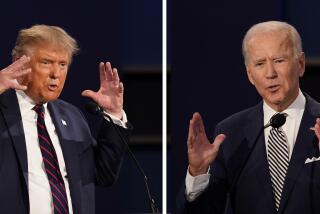The Eternal Debate on God
- Share via
Re “Use the Brain God Gave Us to Debate God,” Commentary, Feb. 7: David Klinghoffer inadvertently raises an important aspect of religious debate. Our founding fathers knew that religion was a lightning rod for controversy and disharmony -- and often a justification for war -- and thus purposely excluded it from our Constitution and our public square.
Klinghoffer discusses the mere tip of the iceberg that is the religious diversity in our country. One wonders how anxious he and his ilk would be to have this “civil debate” were the debaters to include Rastafarians, Jains, Wiccans, Bahais, Zoroastrians, Sikhs and the like, not to mention atheists.
Mr. Klinghoffer, I wish you success with your plea for “reexamining what we think” and “opening our minds.” It is an ambitious goal. As long as religion continues to be defined as Christianity (and occasionally Judaism and Islam), minds will never really need to open very wide and the dialogue will remain incomplete at best.
Ellen Brown
San Diego
*
Though Klinghoffer’s commentary has the merit of attempting to reduce the emotional heat surrounding contemporary religious disputes, it overlooks the fact that most religious beliefs are based not on reason but on emotion.
Debate and disputation come out of reasonable civil societies built on a foundation of tolerance and the mutual acceptance of the idea that no one has the right to overwhelm another’s rights; those rights having been codified into laws.
It is that sense of mutuality that is being lost today in America, where we are arbitrarily divided by politicians into red and blue, good and evil, whites and nonwhites or other such radical dichotomies for the cynical purpose of making themselves appear virtuous.
In such an atmosphere, debates, arguments and disputations are simply not heard by those who have lost their hearing, not seen by those who accept blindness.
The “Great Awakening,” if there is to be one, will come not through religious or secular belief systems, coherent or incoherent, but through a respect for life that overpowers them both.
Jean Gerard
Los Osos
*
Klinghoffer says people who have strong, differing beliefs about religion and God should debate their differences in a spirit of tolerance and respect. But Salman Rushdie disagrees (“Democracy Is No Polite Tea Party,” Commentary, Feb. 7). Rushdie says you should have absolutely no respect for a person’s opinions and you should be savagely rude about what the person thinks. Rushdie’s view is especially relevant to debates about deeply held religious beliefs. For example, a Christian who truly believes in the resurrection of Jesus cannot possibly respect or be tolerant of the beliefs of Jews or Muslims who reject the Christian position.
Sadly, Klinghoffer’s hope for truly tolerant debates on religion is a pipe dream. Tolerant religious debate is an oxymoron.
Sylvan Gollin
Claremont
*
It must have been more than a coincidence, printing articles by Klinghoffer on the joys of debating which religion has the inside track and Rushdie on the stifling of debate by those who believe that their religion is protected from debate.
I would ask Klinghoffer to offer one basic truth found in his religious texts and offer to have the subject debated on the validity of the source, rather than have the game played by the rules of exclusion and assumption.
The last debate Rushdie inspired, in the cause of free speech, was argued in a court of Islamic law. The result was a worldwide demand for the death of a man who was committed to, and condemned for, freedom of thought and expression.
Yes, Mr. Klinghoffer, I will defend your right to express your opinions, if you will defend my right to say that I do not agree with them because they are wrong, discriminatory and offensive, and not because I wish to debate what you believe to be divine authority.
Morton Kurzweil
Margate, Fla.
*
Klinghoffer’s outrageous statement that the Anti-Defamation League predicted that Mel Gibson’s film “The Passion” would lead to “medieval pogroms” is just not true. We were and continue to be concerned about the impact on attitudes toward Jews -- particularly among the young -- of this movie that depicts Jews in an offensive manner and reinforces old stereotypes. In a world where anti-Semitism is resurgent, this is a legitimate concern.
Howard Sherwood
Chair, Pacific Southwest
Region Anti-Defamation
League, Los Angeles
More to Read
Sign up for Essential California
The most important California stories and recommendations in your inbox every morning.
You may occasionally receive promotional content from the Los Angeles Times.













